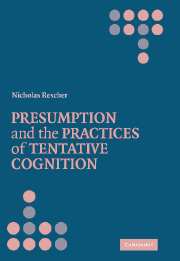Book contents
- Frontmatter
- Contents
- Preface
- Presumption and the Practices of Tentative Cognition
- 1 The Legal Roots Of Presumption
- 2 Presumption and Burden of Proof
- 3 Cognitive Presumption and Truth
- 4 Validating Cognitive Presumptions
- 5 Presumption and Inquiry
- 6 Default Reasoning
- 7 Presumption and Trust
- 8 Presumption and Communication
- 9 Presumption in Science and Beyond
- 10 Specificity Prioritization and the Primacy of the Particular
- 11 Dismissing Extremely Remote Possibilities
- Conclusion
- Bibliography
- Index of Names
8 - Presumption and Communication
Published online by Cambridge University Press: 24 July 2009
- Frontmatter
- Contents
- Preface
- Presumption and the Practices of Tentative Cognition
- 1 The Legal Roots Of Presumption
- 2 Presumption and Burden of Proof
- 3 Cognitive Presumption and Truth
- 4 Validating Cognitive Presumptions
- 5 Presumption and Inquiry
- 6 Default Reasoning
- 7 Presumption and Trust
- 8 Presumption and Communication
- 9 Presumption in Science and Beyond
- 10 Specificity Prioritization and the Primacy of the Particular
- 11 Dismissing Extremely Remote Possibilities
- Conclusion
- Bibliography
- Index of Names
Summary
Communicative Presumption
In the absence of any evidence to the contrary, we proceed on the presumption that people do what they do on the basis of reasons, granting them the benefit of the doubt in point of rationality. We take the stance that there is an explanation of the basis of what they see as good reasons for proceeding as they do – that they act as they do under the impression that some good will come of it, some benefit for themselves or others. Accordingly, when asked to explain why someone did something, it suffices that we establish that this was the rationally appropriate thing for them to do – that this is what any sensible person would have done in the circumstances. We presume people act rationally. Only as a reluctant last resort do we judge that someone has proceeded on the basis of forces or motives outside the range of their rational control. Thus here, as elsewhere, a presumption of normalcy prevails. Realizing full well that people are not always rational, we find that they (fortunately) are so generally and ordinarily, and feel free to proceed on this basis. We grant people the benefit of any doubt and treat them as rational agents in the absence of convincing counterindications. The rational economy of process is clearly at work here.
Cognitive convenience tells the whole story here.
Information
- Type
- Chapter
- Information
- Presumption and the Practices of Tentative Cognition , pp. 104 - 123Publisher: Cambridge University PressPrint publication year: 2006
